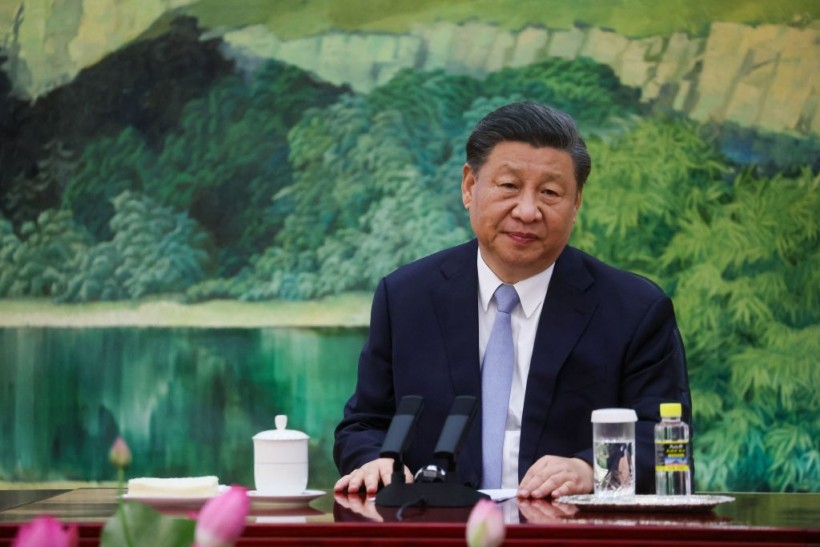
(Photo : LEAH MILLIS/POOL/AFP via Getty Images)
China's President Xi Jinping attends a meeting with US Secretary of State Antony Blinken (not pictured) at the Great Hall of the People in Beijing on June 19, 2023. President Xi Jinping hosted Antony Blinken for talks in Beijing on June 19, capping two days of high-level talks by the US secretary of state with Chinese officials.
The replacement of two leaders of an elite unit administering China's nuclear arsenal sparked rumors of a purge.
General Li Yuchao, who led the Rocket Force branch of the People's Liberation Army (PLA), and his deputy had "disappeared" for months.
Xi Jinping Replaces Top Generals From Nuclear Rocket Force
As replacements, the former deputy navy commander Wang Houbin and party central committee member Xu Xisheng were named. This is the most significant unex[ected change in Beijing's military leadership in nearly ten years.
Xi is also the chairman of the Central Military Commission, China's highest military command, as per BBC.
At a meeting at the end of last month, Xi emphasized the importance of focusing on "addressing prominent issues encountered by party organizations at all levels, such as maintaining the party's absolute leadership over the military," according to Chinese state media.
Beijing has not commented on the whereabouts of Gen Li, his deputy General Liu Guangbin, or Gen Li's erstwhile deputy Zhang Zhenzhong, but the commission's anti-corruption branch has launched an investigation into the three men.
The new appointments of Wang and Xu were announced the day before the 96th anniversary of the PLA's establishment on August 1. They were announced during a ceremony at the commission's Beijing headquarters.
Both have been promoted from lieutenant general to general, which is the highest rank for active service officers in China.
Per Sky News, Wang is appointed commander of the People's Liberation Army Rocket Force, which is in charge of the nation's nuclear missiles, while Xu is appointed political commissar of the force.
Analysts also hypothesized that the decision to appoint replacements from other branches of the Chinese military, Wang from the Navy and Xu from the air force, was intended to disrupt any networks their predecessors may have maintained within the force.
Beijing has not provided any updates regarding the whereabouts of the two missing generals, but foreign officials who have been briefed on the situation believe that they are being investigated for purportedly leaking military secrets.
Adding to the intrigue was China's decision to not explicitly disclose their replacements, with state media merely mentioning the promotions in passing and the government providing no official confirmation.
Read Also: Report: Putin Launches Deadly Missile Strike on Zelensky's Hometown After Drone Attack on Moscow
Chinese Foreign Minister Qin Gang's Disappearance
After last month's disappearance of former Foreign Minister Qin Gang, it is likely that Chinese officials wished to limit further scrutiny of the country's internal affairs.
Qin conducted his final official meeting at the end of June and then vanished, with China initially attributing his disappearance to ill health.
As soon as the country's Foreign Ministry announced Qin would miss several important international conferences, this explanation was quickly discarded, and concern began to grow.
Although the reasons for the former Foreign Minister's disappearance may never be known, a number of hypotheses have been advanced, including an alleged liaison with a prominent broadcaster.
China announced last week that Qin had been replaced by Wang Yi, but provided no update on the whereabouts of the AWOL diplomat. The reorganization of the PLA's leadership on Monday is the most significant upheaval in over a decade.
Former vice chairmen of the Central Military Commission, Xu Caihou and Guo Boxiong, were removed and placed on trial for corruption in 2014 as part of a similar purge to ensure that the CCP retained complete control over the military.
Wang is regarded as a rising talent in the Chinese armed forces, having risen from deputy chief of staff in the fleet at the Eastern Theater Command to deputy naval commander and navy political commissar in a little more than a decade.
He now has full authority over the country's ballistic and cruise missiles, an area China is seeking to swiftly expand, including its nuclear arsenal.
Related Article: Kim Jong Un Brags Drones, ICBMs to Moscow's Defense Minister as North Korea, Russia, and China Celebrate 'Victory' 70 Years Ago









